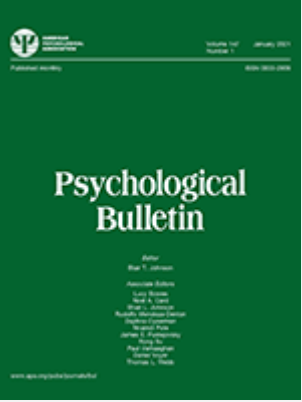Personality and intelligence: A meta-analysis.
IF 17.3
1区 心理学
Q1 PSYCHOLOGY
引用次数: 17
Abstract
This study provides a comprehensive assessment of the associations of personality and intelligence. It presents a meta-analysis ( N = 162,636, k = 272) of domain, facet, and item-level correlations between personality and intelligence (general, fl uid, and crystallized) for the major Big Five and HEXACO hierarchical frameworks of personality: NEO Personality Inventory – Revised, Big Five Aspect Scales, Big Five Inventory – 2, and HEXACO Personality Inventory – Revised. It provides the fi rst meta-analysis of personality and intelligence to comprehensively examine (a) facet-level correlations for these hierarchical frameworks of personality, (b) item-level correlations, (c) domain- and facet-level predictive models. Age and sex differences in personality and intelligence, and study-level moderators, are also examined. The study was complemented by four of our own unpublished data sets ( N = 26,813) which were used to assess the ability of item-level models to provide generalizable prediction. Results showed that openness ( ρ = .20) and neuroticism ( ρ = − .09) were the strongest Big Five correlates of intelligence and that openness correlated more with crystallized than fl uid intelligence. At the facet level, traits related to intellectual engagement and unconventionality were more strongly related to intelligence than other openness facets, and sociability and orderliness were negatively correlated with intelligence. Facets of gregariousness and excitement seeking had stronger negative correlations, and openness to aesthetics, feelings, and values had stronger positive correlations with crystallized than fl uid intelligence. Facets explained more than twice the variance of domains. Overall, the results provide the most nuanced and robust evidence to date of the relationship between personality and intelligence. It is the fi rst to meta-analytically compare how intelligence relates to domains, facets, and items on the major hierarchical measures of personality. In so doing, it provides a robust empirical basis for informing discussion of the reciprocal pathways through which personality and intelligence interact.个性与智力:一项元分析。
这项研究对人格和智力之间的关系进行了全面的评估。它对主要的五大和HEXACO人格层次框架的人格和智力(一般、流动和结晶)之间的领域、方面和项目水平相关性进行了荟萃分析(N=162636,k=272):NEO人格量表-修订版、五大方面量表、五大量表-2和HEXACO人格量表–修订版。它提供了第一个人格和智力的荟萃分析,以全面检查(a)这些人格层次框架的方面水平相关性,(b)项目水平相关性,以及(c)领域和方面水平预测模型。年龄和性别在个性和智力方面的差异,以及学习水平的调节因素,也被检验。这项研究得到了我们自己四个未发表的数据集(N=26813)的补充,这些数据集用于评估项目水平模型提供可推广预测的能力。结果表明,开放性(ρ=.20)和神经质(ρ=−.09)是智力的最强五大相关因素,开放性与结晶智力的相关性大于与流体智力的相关性。在方面层面上,与其他开放方面相比,与智力投入和非传统相关的特质与智力的相关性更强,而社交能力和有序性与智力呈负相关。社交和寻求刺激的方面具有更强的负相关性,对美学、情感和价值观的开放性与结晶而非流动的智力具有更强的正相关性。Facets解释了域方差的两倍多。总的来说,研究结果为人格和智力之间的关系提供了迄今为止最细微、最有力的证据。这是第一次对智力如何与人格的主要等级衡量标准中的领域、方面和项目进行元分析比较。通过这样做,它为讨论人格和智力相互作用的相互途径提供了强有力的经验基础。
本文章由计算机程序翻译,如有差异,请以英文原文为准。
求助全文
约1分钟内获得全文
求助全文
来源期刊

Psychological bulletin
医学-心理学
CiteScore
33.60
自引率
0.90%
发文量
21
期刊介绍:
Psychological Bulletin publishes syntheses of research in scientific psychology. Research syntheses seek to summarize past research by drawing overall conclusions from many separate investigations that address related or identical hypotheses.
A research synthesis typically presents the authors' assessments:
-of the state of knowledge concerning the relations of interest;
-of critical assessments of the strengths and weaknesses in past research;
-of important issues that research has left unresolved, thereby directing future research so it can yield a maximum amount of new information.
 求助内容:
求助内容: 应助结果提醒方式:
应助结果提醒方式:


